International rating agency, Fitch Ratings Inc., yesterday downgraded Nigeria’s credit ratings, citing the likelihood of the country to miss its debt obligations.
In a statement issued, yesterday, Fitch said: “The outlooks are stable. The issue ratings on Nigeria’s senior unsecured foreign-currency bonds have also been downgraded to ‘B+’ from ‘BB-’. The Country Ceiling has been revised down to ‘B+’ from ‘BB-’ and the Short-Term Foreign-Currency IDR affirmed at ‘B’.”
The new ratings imply that though Nigeria is currently meeting financial commitments, there is a limited margin of safety and capacity for continued timely payments is contingent upon a sustained, favourable business and economic environment.
Explaining the rationale for downgrading the country’s rating, Fitch said: “Nigeria’s fiscal and external vulnerability has worsened due to a sharp fall in oil revenue and fiscal and monetary adjustments that were slow to take shape and insufficient to mitigate the impact of low global oil prices. Renewed insurgency in the Niger Delta in the first half of 2016 has lowered oil production, magnifying pressures on export revenues and limiting the inflow of hard currency.
Forecast
Fitch forecasts Nigeria’s general government fiscal deficit to grow to 4.2 percent in 2016, after averaging 1.5 percent in 2011-15, before beginning to narrow in 2017.
“Despite expected increases in non-oil revenue, the agency expects overall general government revenue to drop to just 5.5 percent of GDP, from an average of 12 per cent in 2011-15.
“The fall in general government revenue represents a risk to the country’s debt profile. Fitch estimates general government debt/revenue will rise to 259 percent in 2016 from 181 percent in 2015, higher than the 223 percent median for ‘B’ rated peers. Nevertheless, depreciation of the naira will increase the debt and debt service burden.
“On 20 June, the Central Bank of Nigeria (CBN) commenced trading on the inter-bank foreign exchange market under a revised set of guidelines that will result in a more flexible exchange rate. However, the new regime will not be fully flexible as it will still involve a parallel market as importers of 41 items are excluded from the inter-bank market, which will continue to hinder growth, capital inflows and investment, in Fitch’s view.
Uncertainty
Furthermore, the delayed change in exchange rate policy casts some uncertainty over the authorities’ commitment to a more flexible system. The CBN’s previous exchange rate policy of managing demand for hard currency and restricting access to dollar auctions at the official FX rate resulted in a significant shortage in dollar liquidity.
“Fitch expects that some continued intervention in the FX market will reduce international reserves, which were below USD27bn before the new market began trading, compared with USD34bn at end-2014. Fitch expects reserves to fall to 3.4 months cover of current external payments by end-2016. Fitch forecasts GDP growth to fall to 1.5 percent in 2016, down from 2.7 percent in the previous year, after GDP contracted by 0.4 percent year-on-year in the first quarter of 2016, stemming partly from low hard currency liquidity. The second quarter is likely to experience a further contraction, as the resurgence of violence in the Niger Delta has brought oil production levels down to around 1.5 million barrels per day (mbpd) in May, from approximately 2.1 mbpd in January.”
The naira yesterday strengthened for the second consecutive day in the interbank foreign exchange market for spot and future transactions, while interest rate fell by more than half to 34 percent.
Data released by Financial Market Dealers Quote (FMDQ) showed that the interbank exchange rate for spot transactions rose to N281.67 per dollar yesterday from N282.8 on Wednesday, indicating N1.1 or 0.3 percent appreciation for the naira. However, the interbank exchange rates for all future transactions remained stable.
On the other hand interest rate in the interbank money market dropped sharply by more than half in response to decision of Central Bank of Nigeria (CBN) to open its discount window for banks to use their treasury bills to fund foreign exchange purchases.
Interest rate on overnight lending fell from average of 68 per cent on Wednesday to 34 percent yesterday while interest rate on securitised lending fell to 30 per cent from 63 per cent.
Meanwhile FMDQ yesterday announced it has revised the methodology and publication standard for Nigeria Interbank Foreign Exchange (NIFEX) in line with the Principles for Financial Benchmarks of the International Organisation of Securities Commissions (IOSCO). The revised standard, the company stated, would take effect from today June 24, 2016.


 Billionaire Watch3 weeks ago
Billionaire Watch3 weeks ago
 Startups4 weeks ago
Startups4 weeks ago
 News4 weeks ago
News4 weeks ago
 News4 weeks ago
News4 weeks ago
 Bitcoin4 weeks ago
Bitcoin4 weeks ago
 Naira4 weeks ago
Naira4 weeks ago
 Forex3 weeks ago
Forex3 weeks ago
 Treasury Bills4 weeks ago
Treasury Bills4 weeks ago
























